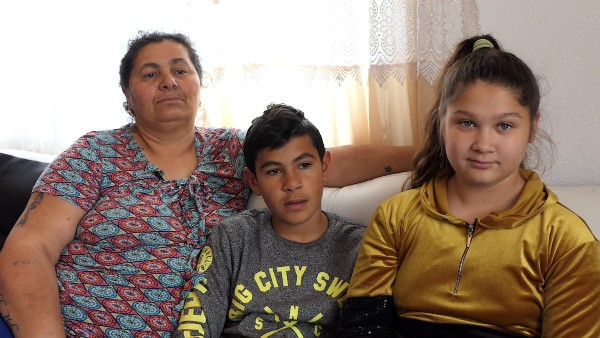 North West Balkans
North West Balkans
Languages
Grandma Mejra from Brčko is Putting Eight Kids through School: Online Classes with Three Phones

Many residents of Brčko know Mejra Šačić and say she is a respected member of the city’s Roma community. This 52-year-old is always ready to help others, get involved in volunteering, lend and ear and offer advice, though her own life is by no means easy.
When she was a girl, her mother left to marry someone else and her father sold her to a man who was much older than her and who forced her to go begging in the streets. “That’s how it was until I met the man who is now my husband. I ran away from my old husband to marry him and we have stayed together to this day. I have five children and from them I have eighteen grandchildren.”
In addition to eighteen grandchildren, Mejra is guardian to another two. Her biggest aim in life is to make sure her grandchildren finish school - eight of them are currently attending school.
“I had a bad childhood, so I’m now trying to make sure my children and my grandchildren do not go through what I have gone through, that they are not left to the streets and bad company. Thank God, they take to school. I want them to be something else in the future, not to be what we are.”
Roma children are very susceptible to the risk of dropping out of school early, and the decision to do so is often made by their parents. Children from dysfunctional families have the highest drop-out rate, as well as children of single parents, of parents who are not educated, and children living in poverty. Thanks to the successfully completed project “Bright4All - Basic Right to Education for All Children in Bosnia and Herzegovina” financed by the European Union and aimed at facilitating access to education for all children in Bosnia and Herzegovina, many children from the Roma community have been attending regular schooling.
The European Union recognised the value of this project and provided financial support. As the implementing organisation, Save the Children partnered with organisations that had long-standing experience in protecting and promoting the rights of vulnerable groups: the Women from Una Association from Bihać and the Vermont Youth Centre in Brčko.
“Previously, the number of Roma children from Brčko who were in regular schooling was very low. Today, we are happy to report that there are around 170 Roma pupils in the Brčko school system, including three in secondary school,” said Asmir Husić, Coordinator of the Vermont Day Centre.
Mejra’s grandchildren, as well as many other youngsters from Brčko, go to the Day Centre to receive educational support and help with school lessons.
“Our professional staff is there to provide support with lessons and homework. We also have professionals who provide counselling, a psychologist and social worker who identify whether the child has problems and whether they feel happy and satisfied with their life here and at home,” Husić explained.
Online Classes Present a Challenge for Roma Pupils
One of the biggest challenges for both the staff and the kids who come to the Day Centre in Brčko was transitioning to online classes during the coronavirus epidemic. With the ban on gatherings, it was impossible to organise workshops and have children come to the centre. Still, the staff of the Day Centre continued providing assistance to the kids online:
“All the kids had to be at home, but we at the Centre set up duty rotations to maintain continuity of assistance. Our staff had online workshops with two or three kids at a time to help them with their lessons,” explained Damir Radenković, director of Centre.
Mejra described how this looked from the user’s end:
“My eldest granddaughter Vanesa (16) has a mobile phone and could use it herself. The other children used my phone and my husband’s phone. They worked with Vermont through the phone, wrote their homework and sent it on to their teachers. We also helped as much as we could. What’s important is that the children could continue their schooling.”
Good practices in the field and examples such as this family build trust in the community and give them hope that change is possible.
“Positive examples from the community are needed so that both parents and children see that it is possible to complete school, make a decent life for yourself and a career, if you put in the effort. What is absolutely needed is precisely the support of parents and loved ones,” Husić pointed out.
“When I go to see the teacher, I go in with my head held high and I leave the same. I have never heard anything bad, that they quarrel or fight with the other children, that they’re not good pupils, that they, God forbid, curse. The whole school is satisfied and the teachers praise my children, the principal too, and the pedagogue, the social worker, everyone. These children deserve a better life than the kind we had. They shouldn’t be marked the way we were marked. They should be brave, learn, finish school,” Mejra proudly concludes.
The Bright 4 All Project has shown that the complex social problem of dropping out of education, caused by material or socio-demographic factors, antisocial behaviours or lack of family motivation, can be solved through comprehensive support. The boys and girls who chose to continue their schooling were not deterred by the emergency situation or by transitioning to online classes. This is proof that establishing a systematic approach leads to good and lasting results.